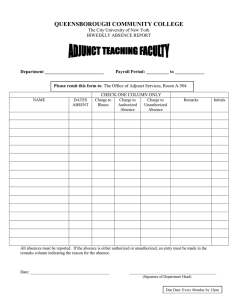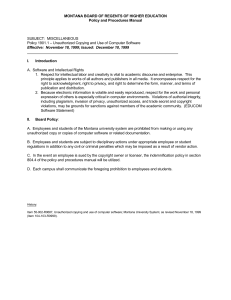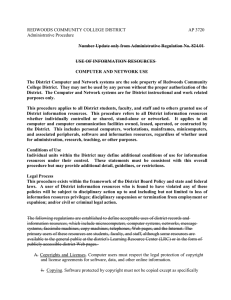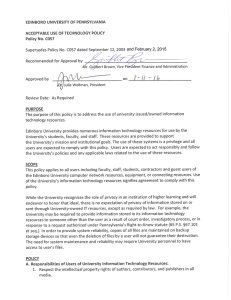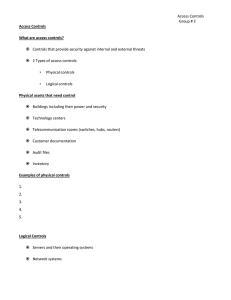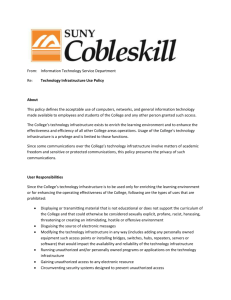USE OF INFORMATION RESOURCES COMPUTER AND NETWORK USE
advertisement
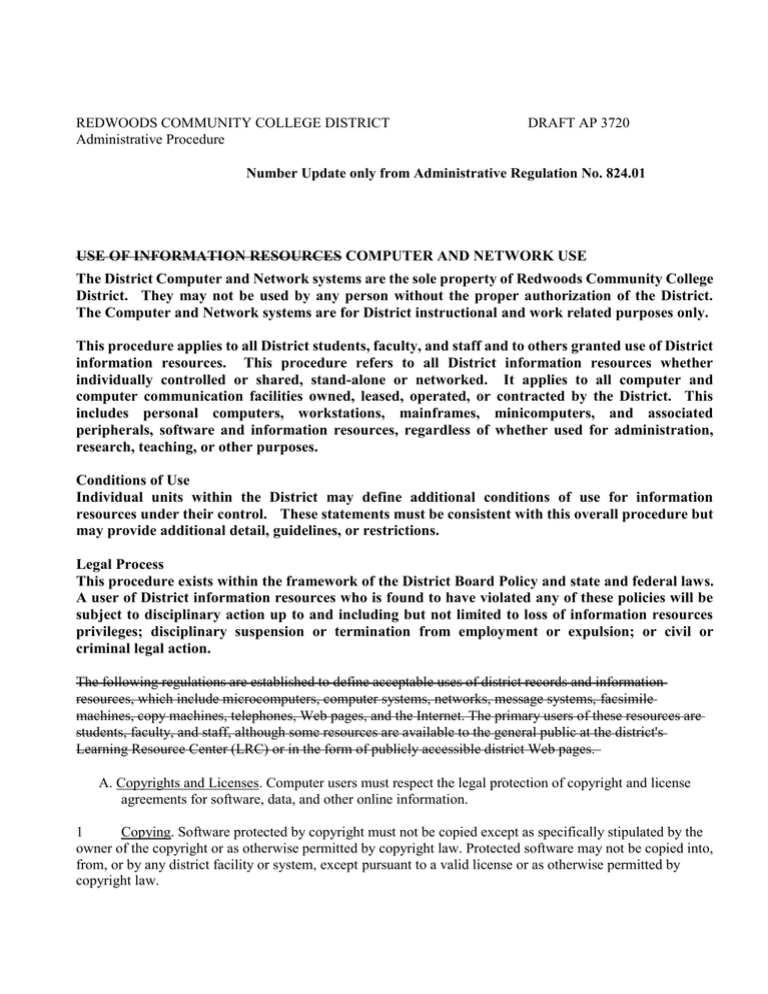
REDWOODS COMMUNITY COLLEGE DISTRICT Administrative Procedure DRAFT AP 3720 Number Update only from Administrative Regulation No. 824.01 USE OF INFORMATION RESOURCES COMPUTER AND NETWORK USE The District Computer and Network systems are the sole property of Redwoods Community College District. They may not be used by any person without the proper authorization of the District. The Computer and Network systems are for District instructional and work related purposes only. This procedure applies to all District students, faculty, and staff and to others granted use of District information resources. This procedure refers to all District information resources whether individually controlled or shared, stand-alone or networked. It applies to all computer and computer communication facilities owned, leased, operated, or contracted by the District. This includes personal computers, workstations, mainframes, minicomputers, and associated peripherals, software and information resources, regardless of whether used for administration, research, teaching, or other purposes. Conditions of Use Individual units within the District may define additional conditions of use for information resources under their control. These statements must be consistent with this overall procedure but may provide additional detail, guidelines, or restrictions. Legal Process This procedure exists within the framework of the District Board Policy and state and federal laws. A user of District information resources who is found to have violated any of these policies will be subject to disciplinary action up to and including but not limited to loss of information resources privileges; disciplinary suspension or termination from employment or expulsion; or civil or criminal legal action. The following regulations are established to define acceptable uses of district records and information resources, which include microcomputers, computer systems, networks, message systems, facsimile machines, copy machines, telephones, Web pages, and the Internet. The primary users of these resources are students, faculty, and staff, although some resources are available to the general public at the district's Learning Resource Center (LRC) or in the form of publicly accessible district Web pages. A. Copyrights and Licenses. Computer users must respect the legal protection of copyright and license agreements for software, data, and other online information. 1 Copying. Software protected by copyright must not be copied except as specifically stipulated by the owner of the copyright or as otherwise permitted by copyright law. Protected software may not be copied into, from, or by any district facility or system, except pursuant to a valid license or as otherwise permitted by copyright law. 2 Number of Concurrent Users. Software license agreements must be respected and strictly followed in every case. If a software license is based on concurrent use, then the number and distribution of copies must be handled in such a way that the number of concurrent users does not exceed the number licensed by the district. 3 Copyrights. In addition to software, all other copyrighted information (text, images, icons, programs, etc.) retrieved from computer or network resources must be used in conformance with applicable copyright and other law. Copied material must be properly attributed. Plagiarism of computer information is subject to the same sanctions that apply to plagiarism in any other media. B. Integrity of Information Resources. Users must respect the integrity of information resources; for example, users shall not intentionally use computer resources in a wasteful or inappropriate manner or develop computer programs that harass other users or infiltrate a computer or system and/or damage or alter the software components of a computer or system. 1. Modification or Removal of Equipment. Computer users must not attempt to modify or remove district computer equipment, software, or peripherals without proper authorization. 2. Installation of Equipment. In order to ensure proper configuration and safeguard network security and performance, no computers or printers may be attached to the district's network or telephone lines except by means of a Work Request submitted to the Information Technology Technical Support Services group (or appropriate system administrator at a particular site). The only exceptions to the foregoing are the following: a. Day-use placement of personal laptop computers within specifically posted areas in the district's libraries, LRC, or other designated sites (in which case local dial-tone service, for access to existing local ISP accounts, shall be offered rather than direct connection to the district's network); and b. Temporary connection of specific sets of district-owned and controlled computers to specific district wireless network access points intended to support those computers. Any unauthorized installation of general network access devices, such as routers, hubs, sniffers, or wireless access points is strictly prohibited and constitutes a serious breach of student or employee conduct. 3. Encroaching on Others' Access and Use. Computer users must not encroach on others' access and use of the district's computers. This includes, but is not limited to: the sending of excessive messages or chain letters, either locally or off-campus; printing excess copies of documents, files, data, or programs; unauthorized modification of system facilities, operating systems, programs, or data; attempting to crash or otherwise make unavailable a district computer or network; and damaging or vandalizing district computing facilities, equipment, cabling, software, or computer files. 4. Unauthorized, Destructive, or Resource-sharing Programs. Computer users must not intentionally develop or use programs that disrupt other computer users or that attempt to access private or restricted portions of the system and/or damage the software or hardware components of the system. Computer users must take all reasonable precautions to ensure that they do not acquire or propagate "malware" agents, including viruses, trojans, or worms, which interfere with other computer users or which compromise the integrity or operation of the district's computing network in part or in whole. Also, unless explicitly authorized by a district official, the use of any district network or computers for resource-sharing, in conjunction with or on behalf of outside parties, is forbidden. Some examples of such disallowed resource-sharing include peer-topeer file sharing (e.g., Kazaa or Napster), CPU sharing (e.g., "SETI @ home"), or other externally accessible services (e.g., unauthorized deployment of Web servers, mail servers, or streaming-media servers). Unauthorized services or protocols may be blocked at network gateways or firewalls at the district's discretion. The use of any unauthorized or destructive program, service, or outside connection may result in legal civil action for damages or other punitive action by any injured party, including the district, as well as criminal action. 5. computers for any use other than that permitted by the lab instructor's directives or by lab, library, or LRC policies. In particular, actions that are disruptive of instruction-such as the use of external e-mail services or accounts, Instant Messaging or similar chat mechanisms, and non-instruction-related Web browsing--are not permitted in labs during class sessions unless explicitly authorized by the lab instructor. C. Unauthorized Access. Computer users must refrain from seeking to gain unauthorized access to information resources or enabling unauthorized access. 1 Abuse of Computing Privileges. Users of district information resources must not deploy any programs or techniques intended to gain for themselves or others access to or control over system resources for which they have not been officially authorized. Computer users must not use a computer account that they are not authorized to use, must not mask the identity of any login account or machine that they use, and must not engage in any action intended to cause a disruption or "denial of service" to any computer or system belonging either to the district or to outside parties. Unauthorized access or destructive actions directed at outside networks or computer systems using district resources will be treated as an abuse of district computing privileges. Use of a district computer resource in an attempt to misrepresent oneself as another party or as an agent of the district is forbidden. 2 Reporting Problems. Any malfunctioning computer work station must be reported to the appropriate authority at that location, such as a lab instructor, lab monitor, or library assistant. Users must not attempt to repair malfunctioning equipment except as part of a class lesson under the supervision of an instructor or instructional assistant. Any defects discovered in system accounting or system security must be reported to the appropriate system administrator so that steps can be taken to investigate and solve the problem. Users who suspect that their district-provided computers or network accounts have been accessed without their permission are expected to change their passwords and must report the suspected activity to a district official. 3 Password Protection. Responsible use includes choosing passwords that are not identical to the user's logon ID or otherwise easily deduced by others. A computer user who has been authorized to use a password-protected account may be subject to civil and criminal liability, and/or employee discipline, if the user discloses the password or otherwise makes the account available to others without permission of the administrator who made the authorization. Users should be aware that outsiders may attempt to impersonate administrators and technicians in an attempt to obtain users' passwords. Users must, therefore, require appropriate, verifiable identification from anyone asking them to divulge their password. D. Privacy. Computer users must respect the privacy of other computer users. An attempt to circumvent mechanisms and systems to gain unauthorized access to any system or to private information is a violation of district policy and may violate applicable laws. Although the district will attempt to protect the privacy of individual user's data and files, authorized system administrators may obtain access to computer users' files, including electronic mail, as necessary to service or troubleshoot network issues, as part of monitoring network traffic flows, or to investigate suspected violations of this policy, including unlawful activity. System administrators will report suspected unlawful or improper activities to the proper district administrator or legal officials. 1 Unlawful Messages. Electronic communication facilities (such as mail, voice, or systems with similar functions) are intended for legitimate district-related activities only. System users are prohibited from sending fraudulent, harassing, obscene, threatening, or abusive messages and are cautioned that such messages may violate applicable federal, state, or local laws as well as the district's Student Code of Conduct (Administrative Regulation 505.015500). All message systems are available for review by authorized institutional representatives in the event that violations of this policy are suspected. 2 E-mail Lists. Users must respect the purpose and charters of computer mailing lists. The user of an electronic mailing list is responsible for determining the purpose of the list before sending messages to or receiving messages from the list. Subscribers to an electronic mailing list will be viewed as having solicited any material delivered by the list as long as that material is consistent with the purpose of the list. Persons sending to a mailing list any materials that are not consistent with the purpose of the list will be viewed as having sent unsolicited material. 3 Advertisements. In general, the district's electronic communication facilities should not be used to transmit commercial or personal advertisements, solicitations, or promotions (See Section E.5, Commercial Use, below). 4 Information Belonging to Others. Users must not intentionally seek or provide information on, obtain copies of, or modify data files, programs, or passwords belonging to other users without the permission of those other users. 5 Confidentiality. The district does not exist in isolation from other communities and jurisdictions and their laws. Under some circumstances, as a result of investigations, subpoena, or lawsuits, the district may be required by law to provide electronic or other records or information relating to use of information resources. 6 Electronic Communications Privacy. While reasonable attempts are made to ensure the privacy of electronic communication, including electronic mail, there is no guarantee that these communications are private. Messages sent over the Internet may be intercepted or divulged by various means, including actions of external senders or recipients. In addition, as noted at the beginning of this section (Section D, Privacy), routine system operations as well as the investigation of policy violations or crimes may result in the divulging of e-mail messages. E. Political, Personal, Internet, Web-page, and Commercial Use. The district is subject to specific federal, state and local laws regarding sources of income, use of real estate, and similar matters. It also is a contractor with government and other entities and thus must assure proper use of property under its control and allocation of overhead and similar costs. 1 Political Use. The district information resources must not be used for partisan political activities where prohibited by federal, state, or other applicable laws, and may be used for other political activities only when in compliance with federal, state, and other laws and in compliance with applicable district policies. 2 Personal Use. The district information resources should not be used for personal or private activities not related to appropriate district functions, except in an incidental manner. Any such incidental use must not violate any other portion of this policy. In the case of limited resources, such as a limited number of computers in a library where students are waiting, educational purposes must always be given precedence over personal use. 3 Internet Use. The use of district resources to access the Internet is a privilege and not a right. The Internet and its resources are provided to support educational activities, including skills acquisition, research, and academic inquiry. Use of computer resources to access the Internet must comply with all aspects of this policy. 4 Web-page Use. The district may provide resources to students and faculty for the development of Internet Web content in connection with specific instructional activities. All student-, faculty-, or staff-developed Web pages must conform to copyright laws, relevant local, state, and federal laws, and these and other district guidelines and policies. 5 Commercial Use. The district information resources must not be used for commercial purposes except as permitted under other written policies of the district or with the written approval of a district officer having the authority to give such approval. Any such commercial use must be properly related to district activities, take into account proper cost allocations for government and other overhead determinations, and provide for appropriate reimbursement to the district for taxes and other costs the district may incur by reason of the commercial use. Users also are reminded that the district's ".edu" domain on the Internet has rules restricting or prohibiting commercial use. F. Prohibition Against Creation of a Hostile Work or Learning Environment. In conjunction with the values of free speech and academic freedom, the district is committed to inclusiveness and diversity, reflecting respect for the wide-ranging diversity of its population as well as for a diversity of good-faith opinions and views. In light of that commitment, district information resources must not be intentionally used to transmit, receive, store, or print material that is explicitly threatening, obscene, disruptive, or otherwise belittling or intolerant of others, to the degree that it could thereby be construed as contributing to the creation of a hostile work or learning environment. G. Employee Responsibilities Related to Student Records, Including Electronic Records. Employees of the district who have access to electronic student records must be aware of and comply with the district regulations regarding the privacy of student records (specifically including AR 506.01, Student Records). Compliance with these regulations includes, but is not limited to: 1. 2. 3. 4. Maintaining security of records and information. Maintaining appropriate privacy of records. Avoiding inappropriate discussion of student records. Destroying and/or deleting records when appropriate. H. Violations. Violation of regulations regarding the use of information resources and/or regulations related to student records is grounds for imposing disciplinary action up to and including expulsion, dismissal from employment, and/or legal action. Former Administrative Regulation No. 824.01, number change only on June 5, 2012 Approved: April 6, 1998 Revised: 11/5/02; 6/3/03
